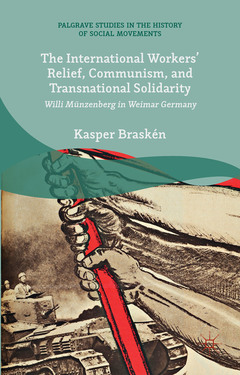Description
The International Workers’ Relief, Communism, and Transnational Solidarity, 1st ed. 2015
Willi Münzenberg in Weimar Germany
Palgrave Studies in the History of Social Movements Series
Author: Braskén Kasper
Language: English
Subjects for The International Workers’ Relief, Communism, and...:
Keywords
Transnational Solidarity; German Communism; the Weimar Republic; Willi Münzenberg; anti-imperialism; anti-fascism; anti-war movement; Soviet cinema; internationalism; 1922; communism; fascism; German communism; Germany; nationalism; resistance; Union of Soviet Socialist Republics (USSR); Weimar
319 p. · 14x21.6 cm · Hardback
Description
/li>Contents
/li>Biography
/li>
2. Awakening International Solidarity, 1921
3. Re-Imagining International Solidarity, 1922–23
4. Solidarity for Germany, 1923
5. Creating a Permanent International Solidarity Organisation
6. Broadening and Radicalising Solidarity, 1924–32
7. Towards a Global International Solidarity, 1924–26
8. Solidarity on the Screen and Stage
9. Celebrating International Solidarity, 1930–32
10. International Solidarity against War and Fascism, 1927–33
Kasper Braskén is Postdoctoral Researcher at Åbo Akademi University, Turku, Finland. He is a historian specialising in German, transnational and social movement history. He is the co-editor of H-Socialisms and the author of several articles on international solidarity, communism and anti-fascism.




